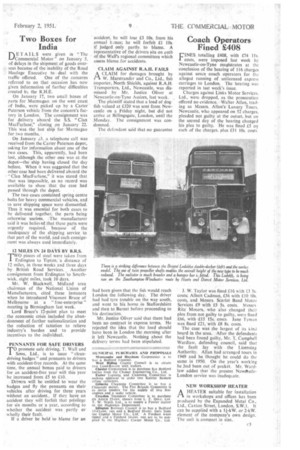Two Boxes for India
Page 41

If you've noticed an error in this article please click here to report it so we can fix it.
DETAILS were given in "The 1.--,Commercial Motor" on January 5, of delays in the shipment of goods overseas becanse of the inability of the Road Haulage Executive to deal with the traffic offered. One of the concerns referred to on that occasion has now given information of further difficulties created by the R.H.E.
On January 17, two small boxes of parts for Marmagao. on the west coast of India, were picked up by a Carter Paterson vehicle from the concern's factory in London. The consignment was for delivery aboard the S.S. "Clan MacFarlane," closing on January 22. This was the last ship for Marmagao for two months.
On January ‘3, it telephone call was received from the Carter Paterson depot, asking for information about one of the two cases. This, apparently, had been lost, although the other one was at the depot—the ship having closed the day before. When it was suggested that the other case had been delivered aboard the "Clan MacFarlane," it was stated that that was impossible, as no record was available to show that the case had passed through the depot.
The two cases contained spring centre , bolts for heavy commercial vehicles, and to save shipping space were dismantled. Thus it was essential for both cases to be delivered together, the parts being otherwise useless. -The manufacturer said it was belic5.e.cl_that these parts were urgently required, because of the inadequacy of the shipping service to that part of the world, and each consignment was always used immediately.
12 MILES IN 24 DAYS BY B.R.S.
Twpieces of steel were taken from Erdington to Tipton, a distance of 12 miles, in three weeks and three days by British Road Services. , Another consignment from Erdington to Smethwick, eight miles, took 10 days.
Mr. W. Blackwell, Midland area chairman of the National Union of Manufacturers, cited these instances when he introduced Viscount Bruce of Melbourne at a " free-enterprise " meeting in Birmingham last week.
Lord Bruce's 12-point plan to meet the economic crisis included the abandonment of further nationalization and the reduction of taxation to relieve industry's burden and to provide incentives to the individual.
PENNANTS FOR SAFE DRIVERS
T°promote safe driving. T. Wall and Sons, Ltd., is to issue "cleandriving badges" and pennants to drivers with accident-free records. At the same time, the annual bonus paid to drivers for an accident-free year will this year be increased from £5 to £10.
Drivers will be entitled to wear the badges and fly the pennants on their vehicles after driving for three years without an accident. If they have an accident they will forfeit that privilege for six months or a year, according to whether the accident was partly or wholly their fault. _
If a driver be held to blame for an accident, he will lose £3 10s. from his annual Is.mus; he will forfeit ft 10s. if judged only partly, to blame. A representative of the drivers sits on each of the Wall's regional committees which assess blame. for accidents.
CLAIM AGAINST R.A.H. FAILS A CLAIM for damages brought by W. Marstrander and Co., Ltd., fish importer, North Shields, against R.A.H. Transporters, Ltd., Newcastle, was dismissed by Mr. Justice Oliver at Newcastle-on-Tyne Assizes, last week. The plaintiff stated that a load of dogfish valued at £320 was sent from Newcastle on a Friday night, but did not arrive at Billingsgate, London, until the Monday. The consignment was condemned.
The defendant said that no guarantee
had been given that the fish would reach London the following day. The driver had had tyre trouble on the way south, and went to his home in Staffordshire and then to Barnet before proceeding to his destination.
Mr. Justice Oliver said that there had been no contract in express terms. He rejected the idea that the load should have been in London the morning after it left Newcastle. Nothing about the delivery terms had been stipulated.




























































































